Reasons for malfunctions: why do heating batteries make noise in a private house and how to fix it?
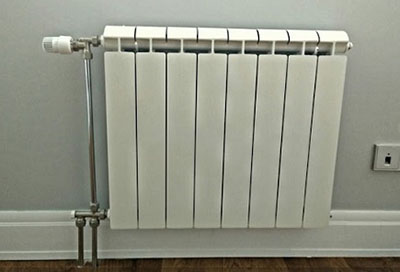
Noisy batteries - an unnatural phenomenon, causing significant discomfort to residents of a private house. The volume of crackling, splashing, and gurgling is not always evenly distributed throughout the entire system.
Some rooms in the house do not suffer, while in some rooms it is simply impossible to be present. The problem is aggravated by the use of metal elements when installing radiators - metal conducts vibrations perfectly, making the hum loud and pervasive.
Identifying the cause of the noise is a priority task, since extraneous sounds indicate problems with a system that is vital in the cold season. Some of the causes, if left unattended, will lead to to failure of the heating circuit, accidents or major material damage.
Content
Why do heating batteries make noise in a private house?
The radiators in a private house are noisy for various reasons. The breakdown can be fixed only after it is known exactly why the radiators are making noise.
Excessive pressure
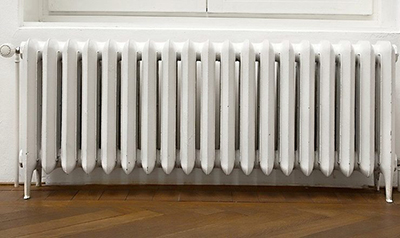
Radiator noises caused by excess pressure inside the entire installation signal about the danger of a breakthrough.
Technical communications are designed for a certain working pressure, which is controlled by means of sensors - pressure gauges.
Based on the standard indicators specified for a specific heating system circuit, it is possible adjust the pressure supplied by the pump, on one's own.
Incorrect installation of the thermal valve
The home handyman does not see the difference which side to install the radiator shut-off valve. But if the thermal valve is installed incorrectly, hot water pressure on the valve, causing noise. Such a tap can tap periodically.
Noise of the pump in the boiler room
Previously, it was common practice to place the pumping equipment in a separate building. to reduce the volume of the sound it producesModern pumps are located in the basement of private houses.
Their operation has been improved to such an extent that it is possible to use the heating circuit as efficiently as possible with minimal discomfort to the ear.
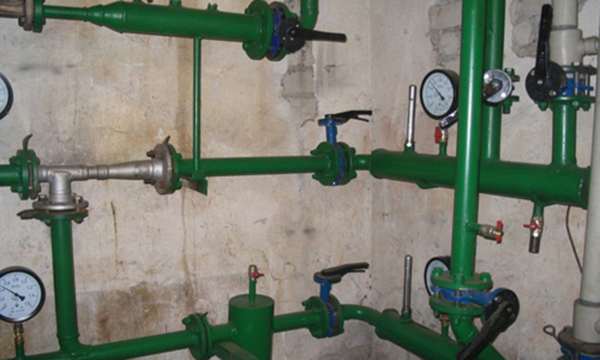
Photo 1. Pumps in a boiler room located in a semi-basement can cause vibration and noise from radiators.
But it is not chosen correctly for a particular house. pump power is reflected in the appearance of constant noise from radiators and pipes. Metal communications transmit excellently vibrations of a powerful supercharger throughout the private house.
Attention! To prevent this effect, it is necessary to adjust (reduce) the power of the pump, and before installing it coordinate its performance with specialists.
Boiler malfunction
Control of the correct functioning of the device eliminates the troubles of operating the battery, failure. The first sign of malfunctions of the boiler functions is the appearance of extraneous sounds.
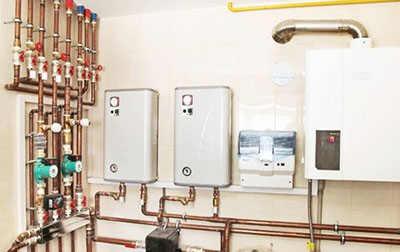
To eliminate the defect, adjust the on/off modes of the heating device.
The frequency of mode change occurs once every 20-40 minutes. Good performance indicators - 75–80% of the boiler's rated power.
A good solution to the problem is to install automatic room regulators that independently control the boiler power by measuring the temperature on a specific radiator.
Uneven supply pipes
When installing a “communicating vessels” system in a private home the laws of hydrostatics are strictly observed. All installation work is carried out using a level - a device that controls the parallelism and perpendicularity of the heating circuit elements to the ground level. Pipes installed at an angle create unnecessary change in water level, causing a splash inside them.
Battery displacement when heated
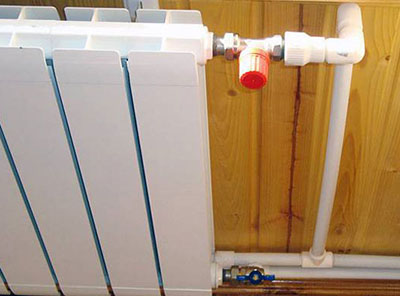
The radiator is attached to the wall using special brackets made of metal. with lower thermal conductivity, rather than the batteries themselves.
This protects the stands from unnecessary heating, which reduces the temperature of the entire heating system of a private house.
Bracket material little subject to thermal expansion.
And heating radiators react sensitively to temperature changes of the coolant. Material with high thermal conductivity expands significantly when heatedThe joints of such different elements often crack and click.
Reference! To prevent contact of parts, occurrence of noise and subsequent corrosion of metal in these places of the battery, elastic gaskets are used. The best ones are rubber washers.
Change in coolant temperature
Failures in the operation of the circuit system also occur due to inconsistency of the heating unit power.
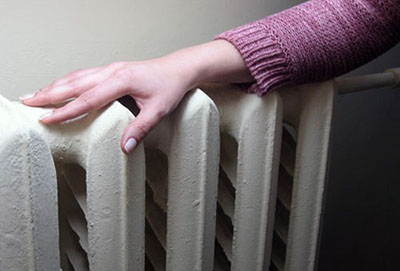
The degree of heating in the battery is regulated, but it is better to carefully select all elements of the heating system in advance.
If the boiler is designed 2 kilowatts, and the total power of the radiators is 1 kilowatt, then this will periodically lead to failures in the circuit, tension in the pipes, and noise.
The material from which the batteries and pipes are made is also taken into account. Previously, cast iron, which steadfastly withstood fluctuations in the heating system.
Now, other materials are becoming more common, which are less resistant to temperature increases, although they are more attractive in other respects.
Radiator clicking and knocking: causes of crackling, knocking and clicking
Specific sounds in the heating system are created when there is foreign particles. Many people reject this possibility, since the heating circuit of a private house is looped and is closed system with a small circulation of coolant. But the appearance of debris in the batteries, which causes them to knock, is a cumulative phenomenon.
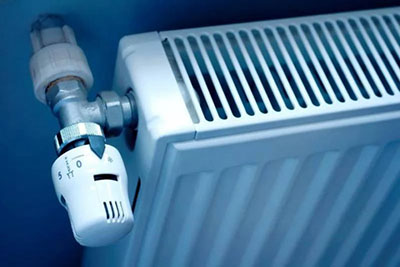
The water used for heating does not pass through filters, but is taken from a regular water supply. With constant heating, metal salts settle on the walls of pipes and radiators, forming scale.
Breaking away under the pressure of water, the particles move from place to place, as if they were clicking.
It is much easier to eliminate the problem of crackling, knocking and clicking in a radiator for a private house than for an apartment building. Almost any owner can do it on their own. Through the bypass valve, the coolant is flushed down the drain. The heating circuit and adjacent communications are flushed with clean water. Then the coolant is replenished again.
If the valve malfunctions, it is sufficient simple replacement of an obsolete element.
The gurgling sound of water in the radiators and methods of elimination
Water in radiators can gurgle for various reasons. To determine this, you need to know feature of radiators.
Leaky connections
Air bubbles create splashing and gurgling sounds that frighten homeowners. The main reason for their appearance is the lack of tightness in threaded connections. Heating circuit sucks in air almost always in such conditions. A good owner knows this feature and controls condition of valves, pipe joints for integrity and tightness.
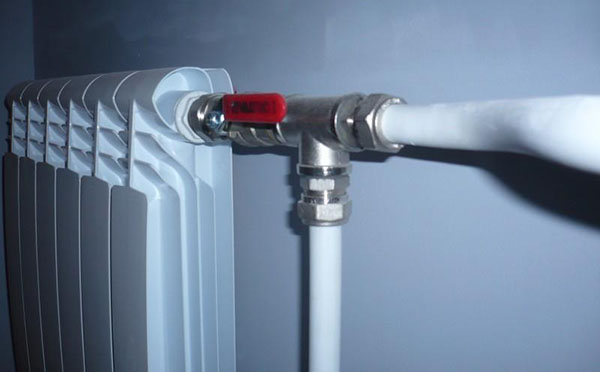
Photo 2. Leaky threaded connections of the battery create gurgling sounds, so you should always check the joints.
Bleeding air when unpleasant “symptoms” appear is a reliable way to avoid discomfort when using water heating devices in a private home. If there is Mayevsky cranes you can quickly bleed air from a single battery. The "culprit" is determined by probing. The radiator in which air has accumulated loses temperature, cools down at the top.
Air was not properly removed from the system before starting.
Be sure to do it thoroughly let the air out when commissioning the heating circuit. Heating lines extend from the boiler, each of which has a circulation pump installed. It is necessary on the front side of the pump unscrew the screw. Then the water will start to drain and the air will be released.
During the procedure comes out about ten liters of coolant. To prevent the automation from blocking the boiler operation when it reacts to a sharp drop in pressure, the system is simultaneously supplied with an additional amount of liquid.
Error in installation of heating system
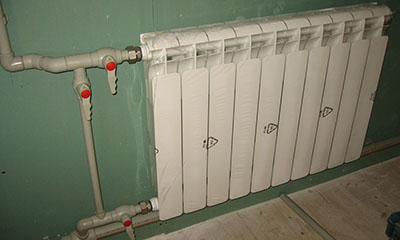
The heating circuit in a private house is a serious communications system. It is forbidden to install its elements without observing strict rules.
Violations of the laws of hydrodynamics and heat exchange threaten serious problems for the residents of the entire building.
The materials used must comply with standards, have good resistance to adverse conditions, and be used only for their intended purpose.
Attention! Installation and commissioning of the heating system is carried out by only a specialist.
Incorrect fitting size
The discrepancy between the dimensions of the connecting elements and the dimensions of the main pipe leads to to the emergence of constant noise and gurgling. The internal diameter of the fittings changes the pressure of the coolant, the speed of its flow in the zones of its location. This provokes not only the appearance of sound, but also an additional load on the pump. All parts of the circuit are selected one size fits all.

Photo 3. Connecting fittings and circuit pipes must match in size and diameter.
Defective expansion tank
When the membrane ruptures expansion tank, air penetrates into the device. In this case, the general the pressure drops and does not recover even when adding coolant to the system. If it is impossible to repair it yourself, a new tank is purchased and installed, as this element is especially important for maintaining constant pressure in the home heating system.
Useful video
From the video you can learn about some of the reasons for the appearance of noise and crackling in batteries and how to fix the breakdown.
Results
Self-diagnosis of the causes of noise in batteries is a troublesome matter for an ordinary person. It is difficult to determine exactly reasons for disruption in work, since the heating system of a private house is autonomous, closed. It is better to contact specialists immediately. They will quickly and accurately find the problem and fix it efficiently.






